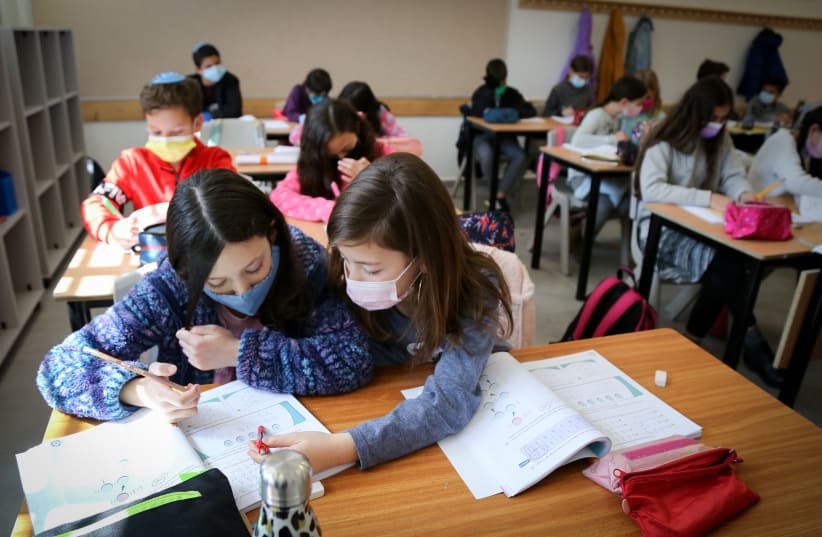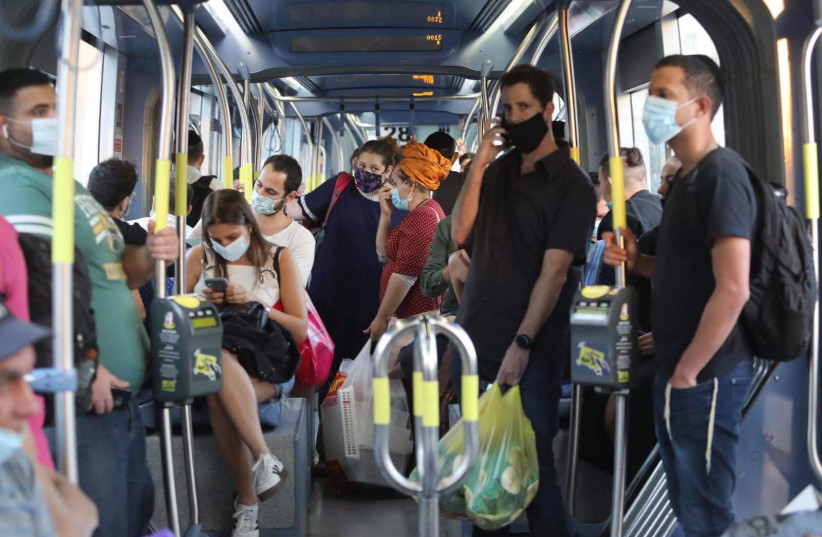Israel registered 8,716 new coronavirus cases on Tuesday, the most since February 1, as it prepared to roll out an expanded version of the Green Pass program on Wednesday and health officials continued to push for harsher rules.
At last count, 579 people were in serious condition, an increase of more than 50 since Monday, the Health Ministry reported. About 6.2% of the people screened tested positive, it said.
The numbers were rolled out on the same day that researchers from the Hebrew University of Jerusalem who have been advising the government released a report that predicted the country could have 150 to 250 COVID-19 deaths per week by the end of August.
Since the start of the pandemic, 6,699 people have died from the coronavirus, including 13 on Monday and another five between midnight and press time on Tuesday. Since the beginning of the month, 221 COVID-19 patients have died, compared with 52 in July and eight in June.
Moreover, more of the country has turned from green to red. There are 49 “red cities” in which infection rates are high, according to the Health Ministry’s website.
Currently, more than 56,000 people are sick with the virus. There will soon be one million people who have been infected with the virus since the pandemic began in early 2020.
Severe morbidity in the vaccinated population, however, is on the decline, according to the Hebrew University report. But there is a continual rise among the unvaccinated, it said, adding that the chance of an unvaccinated person over the age of 70 developing serious COVID-19 is seven times higher than for a person who is vaccinated.
With the decline among serious cases, Israel is less likely to reach the feared 2,000 or more serious cases officials were talking about before the third-shot campaign was launched. More likely, Israel will be close to 1,200 serious patients at a time or fewer, the researchers said.
“On the one hand, there is a decline in the number of serious patients in recent days,” Prof. Eli Waxman of the Weizmann Institute of Science, who has been advising the National Security Council, said in an interview with Ynet. “On the other hand, the number of new verified cases is skyrocketing.”
Consistently, about 2.5% of all sick people develop serious COVID-19, “and that will probably continue,” he said.
On Monday night, the government decided that students in grades eight to 12 who live in red cities with high infection rates and where at least 70% of other students in their class are not vaccinated will have to learn online and not in schools.
The new policy was made in a joint announcement by Prime Minister Naftali Bennett, Health Minister Nitzan Horowitz and Education Minister Yifat Shasha-Biton. They said 70% of the students will be determined by combining those who have been vaccinated with those who have recovered from the virus and who tested positive for having antibodies against it.
In red cities where at least 70% of students are vaccinated or recovered, in-person learning will continue.
Younger grades will be subject to the Education Shield (Magen Hinuch) program, which requires that unvaccinated students be tested every week in schools in red and orange cities to help detect infection early.
The Health Ministry said it will designate the color of municipalities each week on Wednesdays.
School is slated to start on September 1, with the government and education system working to enable this to happen. However, on Monday, Health Minister Director-General Nachman Ash reiterated that “if we do not see a slowdown in morbidity, we will reach a situation where we must postpone the start of the year.”
Last week, the Education and Health ministries shared their five-tiered plan for keeping children safe. It includes serological and rapid antigen testing and the Magen Hinuch program. In addition, a special Green Class outline is meant to allow students to stay in school if they are negative for the virus even after they were in contact with a classmate who was found to be infected.
Meanwhile, some 6,000 reservists had been called up to help with the serological testing program, with the aim of screening some one million students and distributing two million home testing kits to parents before September 1, Defense Minister Benny Gantz announced.
The Education Ministry has said it expects about 5,000 students to be diagnosed with coronavirus once the school year starts. One week after the haredi schools opened, the ministry reported a 130% jump in the number of infected ultra-Orthodox students compared with its report at the beginning of the month.
Bennett plans to make a strong push over the next two weeks to get more students ages 12-15 vaccinated before the start of the school year. Currently, around 38% of these students have been inoculated.
Horowitz has said he would push to ensure students can vaccinate at school, going against strongly worded statements made by Shasha-Biton.
A group of senior ministers have asked Bennett and Horowitz to issue an order stipulating that vaccination be held during school hours, even without Shasha-Biton’s consent, KAN News reported Monday. Sources close to Horowitz have confirmed he does have the authority to do so, KAN News reported.
Meanwhile, the Education Ministry is pushing to make the vaccines accessible, more likely before and after school and with parental consent.
The expanded Green Pass program goes into effect on Wednesday and will now apply to all branches of the economy except malls and places of commerce. It will also apply starting from age three.
That means people who are unvaccinated, by choice or because they do not qualify for the shots, will be required to present a negative COVID test before entering swimming pools, gyms, academic institutions, sports and culture events, conferences, museums, libraries, restaurants and hotels.
Tests for children up to 11 will be paid for by the state, whereas anyone 12 or older will be required to fund the screenings on their own.
Malls and other shopping centers will be subject to the Purple Ribbon outline, meaning there can only be one person per seven square meters in any establishment over 100 sq.m.
However, due to the uptick in infections, Health Ministry officials are pushing to further expand the restrictions.
“We have already asked the cabinet several times for new restrictions,” Sharon Alroy-Preis, head of the Health Ministry’s Public Health Services, told Radio Kol Chai.
There is not yet any indication of when such a decision would be made.
Tzvi Joffre contributed to this report.

